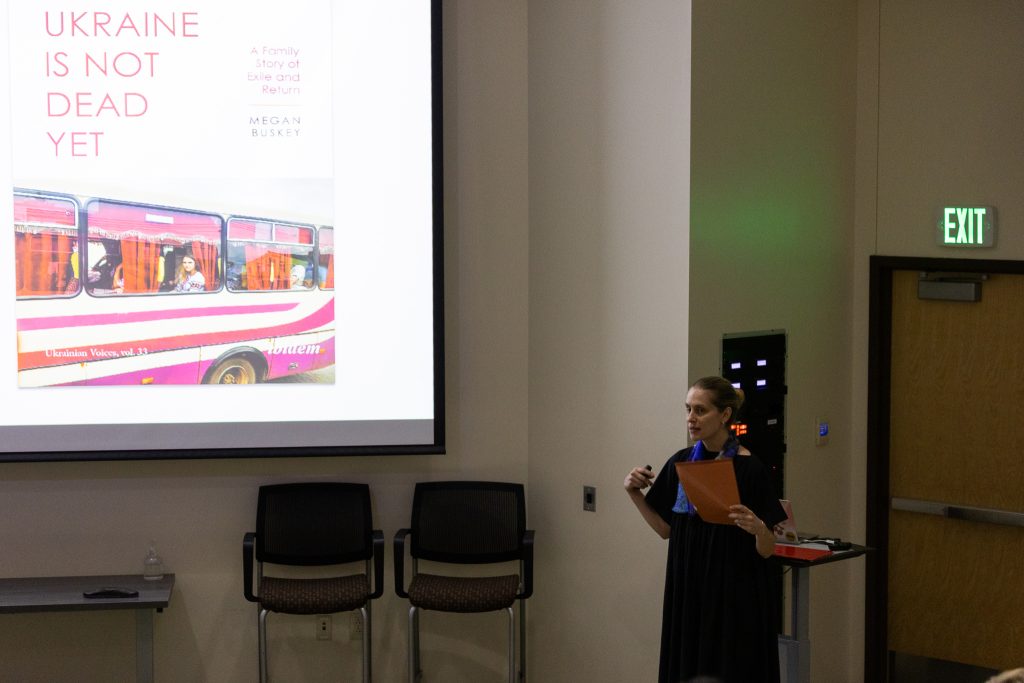Megan Buskey, a Ukrainian-American writer, visited Binghamton University on Thursday to discuss her book, “Ukraine is Not Dead Yet: A Family History of Exile and Return.”
The book, which won the 2024 Book Prize from the American Association for Ukrainian Studies, centers around Buskey’s endeavor to document her Ukrainian family’s experience during the 20th century. Focusing on experiences during and in the wake of World War II, Buskey explored recent Ukrainian history — including violent nationalism, Nazi collaboration and Russia’s 2022 invasion — that she feels can help readers understand current events in Russia and Ukraine.
Buskey, who was born and raised in Cleveland, Ohio, grew up surrounded by Ukrainian culture, attending a Ukrainian church and school. She was also very close with her Ukrainian grandmother, whose death in 2013 inspired her to write her book. She has traveled to and studied the former Soviet Union for two decades and resided in Ukraine for a year as a Fulbright Scholar. Her work has appeared in publications like The Nation, The American Scholar, National Public Radio’s All Things Considered and The New York Times Book Review.
The talk — organized by the history, German and Russian Studies departments, and the Russian and East European Program — was part of the latter’s ongoing lecture series “Exile and Belonging,” which focuses on covering conflicts in Eastern Europe and Eurasia. Heather DeHaan, an associate professor of history and the director of the Russian and East European Program, invited Buskey to campus, hoping a speaker with Ukrainian heritage would help the community better understand Russia’s 2022 invasion and the history behind it.
“Many Americans have little knowledge of that part of the world,” DeHaan wrote in an email. “They know that U.S. policy sustains Ukraine in its efforts to defend itself from Russia’s invasion, but they don’t know where to begin in making sense of who the Ukrainians are or have been or why Americans should care about this war.”
When conducting her research for her book — reading books on Ukrainian history, speaking to relatives and accessing archival documents about her family’s history during the war — Buskey had to reckon with different types of brutality and injustices committed against her family and the extreme poverty and lack of basic resources and education in their village, Staryava. When she was 15 years old and three months pregnant, Buskey’s grandmother, Anna, married a man much older than her, most likely the result of rape. Anna’s second husband, Buskey’s grandfather, was conscripted into forced labor in the Third Reich, and both her grandparents were exiled to Siberia in 1947, where they stayed for nearly two decades.
Though these topics focused on personal tragedies which many of her family members struggled to discuss, Buskey used her research to share her family’s history from her perspective without speaking for others.
“I was motivated by the fact that I hadn’t seen a narrative like this before, that there hadn’t been something in a book written about an ethnic Ukrainian family during World War II and the choices that they made or the conditions that they lived in,” Buskey said. “And that felt to me important and like a contribution, so I was able to kind of push my way toward actually finishing it.”
Throughout her research, Buskey also had to confront violence perpetrated by her family. A key point of interest in the novel is her uncle Stefan, who went to Germany willingly as a laborer during the Nazi regime, believing the invasion of Russia could lead to an independent Ukraine. Later, he returned to Ukraine and joined the Nazi Auxiliary Police, who were instrumental in carrying out the Holocaust. His involvement in the Sluzhba Bezpeky, a particularly ruthless intelligence service within the Organization of Ukrainian Nationalists, led to his death during a battle with the Soviets and his family being sent to Siberia.
Emphasizing these dialogues’ importance among Ukrainian-Americans, Buskey acknowledged that the war in Ukraine has made it difficult to have many of these conversations. Buskey argued that these dialogues should be encouraged by the Ukrainian diaspora in the United States because they are not directly experiencing or actively traumatized by the war.
Actions being taken by Ukrainians to reflect on their history — despite the large-scale suffering they face — were highlighted during the lecture, including the restoration of a synagogue to become a center for Jewish life and a group of researchers interviewing the elderly in Ukraine.
“When we think about Russia’s war in Ukraine and the many, many things that it has destroyed and continues to threaten, I want us all to remember that a constructive and honest dialogue about the past is one of those things,” Buskey said.



